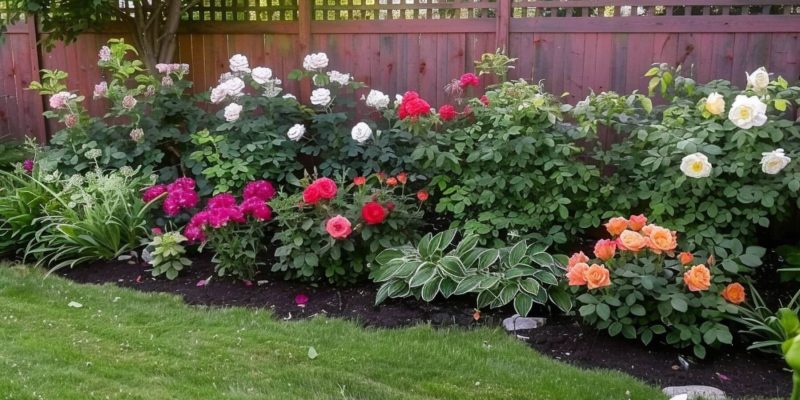Are you thinking about adding a little more privacy to your garden in Columbus? Choosing the right type of fence not only keeps prying eyes out but also enhances the beauty and value of your home. Let’s explore some great ideas on how to make your garden a private retreat.
The Importance of a Privacy Fence
Privacy fences are more than just a way to stop neighbors from peeping into your backyard; they serve several vital roles in making your home a safer and more enjoyable place.
Firstly, a well-built fence offers security by deterring intruders and keeping pets and children safe inside your property. It also provides a sound barrier, reducing noise from busy streets or noisy neighbors, which is especially beneficial in bustling areas of Columbus.
Moreover, privacy fences clearly mark property lines, helping to avoid disputes with neighbors over boundaries. They can also block unsightly views, transforming your outdoor space into a serene oasis.
NOTE
Whether you’re sunbathing, gardening, or hosting a backyard barbecue, a privacy fence ensures that your activities remain private and undisturbed.
Top Cost-Efficient Privacy Fence Ideas
Wooden Fences
Wood is a timeless choice for privacy fencing due to its natural look, ease of installation, and versatility. It can be painted or stained in any color to match your home’s exterior and can be cut to any height to meet local regulations in Columbus.
However, it requires regular maintenance like painting or sealing to prevent rot and termite damage.
Bamboo Fences
For a more environmentally friendly option, bamboo fencing is highly sustainable due to its fast growth rate. It provides a unique aesthetic with its natural texture and color, creating a standout feature in your garden.
Bamboo is also quite sturdy and offers good privacy, but it may require treatment to resist weather and pests.
Vinyl Fencing
Vinyl is an excellent alternative for homeowners looking for a low-maintenance solution. It doesn’t warp, rot, or need repainting. Available in various styles and colors, vinyl fencing can mimic the look of wood or stone, offering durability and flexibility in design.
Recycled Materials
Using recycled materials like pallets or old shutters can be a cost-effective and creative way to build a privacy fence. This approach not only saves money but also contributes to environmental conservation. You can arrange the materials vertically or horizontally and paint them to create a unique and personal touch to your garden.
Enhancing Privacy with Style
While practicality and cost are crucial, the visual appeal of your garden fence should not be overlooked. Here are a few ideas that combine aesthetics with privacy, making your garden both a private and picturesque retreat:
Decorative Metal Panels
Metal panels can be both durable and artistically appealing. With various patterns and designs, such as laser-cut leaves or abstract motifs, these panels provide privacy while serving as a standout feature in your garden.
Mixed Materials
Combining different materials, such as wood and glass or stone and metal, can create a modern look that complements a contemporary home design. This mix can provide both solid privacy and stylish transparency, tailored to specific sections of your garden.
Living Walls
A living wall or vertical garden serves as a green privacy screen. By cultivating a mix of perennial plants, ferns, or small shrubs, you can build a fence that’s alive and also eco-friendly. This option not only enhances privacy but also improves air quality and adds a lush element to your outdoor space.
Wrought Iron with Climbing Plants
Wrought iron fences with spaces for climbing plants offer a balance between openness and privacy. As the plants grow, they fill in the gaps, enhancing privacy while keeping the elegant structure of the ironwork visible.
Common Issues with Privacy Fencing
When installing a privacy fence, you might face a few challenges. Maintenance is a significant concern, especially for wooden fences which require periodic staining or sealing to prevent weather damage. Choosing materials that withstand humid Georgia weather without deteriorating quickly is crucial.
Weather resistance is another issue; materials like bamboo may need extra treatment to cope with the local climate.
… installing a fence without proper planning can lead to disputes with neighbors over boundary lines.
Additionally, installing a fence without proper planning can lead to disputes with neighbors over boundary lines. It’s essential to consult local zoning regulations to determine the maximum allowed height and ensure the fence is constructed within your property boundaries.
Design and Installation Tips
Planning Your Fence Layout
Before digging any holes, it’s crucial to design your fence layout carefully. Start by determining where your property lines are to ensure your fence is built on your land in Columbus.
Consider how high you want your fence for optimal privacy and check local zoning laws to ensure compliance. Think about the function and aesthetics of your fence—do you want it to block a particular view, or do you need it to contain pets? A well-thought-out layout can help achieve these goals effectively.
DIY vs. Professional Installation
Installing a privacy fence can be a rewarding DIY project, especially if you’re using materials like wood or bamboo that require basic tools. However, for materials like vinyl or if you’re using recycled materials in a complex design, hiring a professional might be better.
Professionals can ensure that the fence is sturdy, properly aligned, and meets local building codes, which is particularly important for maintaining peace with your neighbors and avoiding future legal issues.
Enhancing Fence Aesthetics
A privacy fence should be functional and add to the beauty of your home. Consider integrating plantings like climbing vines, shrubs, or a flower bed along the fence line to soften its appearance and blend it into your landscape.
For wooden fences, choosing the right stain can enhance the natural beauty of the wood, while decorative elements like post caps and lattice work can add a touch of elegance.
Frequently Asked Questions
What is the most affordable material for a privacy fence?
Wood is generally the most affordable material for a privacy fence, especially if you opt for local varieties. However, keep in mind that it requires maintenance to keep it looking good and functioning well.
How high can my garden fence be?
The typical maximum height for a backyard privacy fence is usually around 6 to 8 feet, but it’s essential to check local zoning regulations as these can vary.
How do I choose the right fence for my climate?
Select materials that are known for their durability in various weather conditions. Vinyl is excellent for humid climates as it doesn’t rot or corrode. If you prefer natural materials like wood or bamboo, ensure they are treated to resist moisture and pests.
Can I install a privacy fence myself?
Yes, you can install a privacy fence yourself if you have the right tools and a basic understanding of construction. It’s a great way to save money on installation costs. Ensure you understand local building codes and have a clear plan before starting.
Conclusion
Installing the right privacy fence in your garden can transform your outdoor living space into a private, peaceful retreat right in the heart of Columbus. With the right materials and design, your fence will not only provide privacy but also enhance the overall aesthetics of your home. Remember to choose materials suited to our local climate and to follow local regulations to ensure your fencing project is a success.

